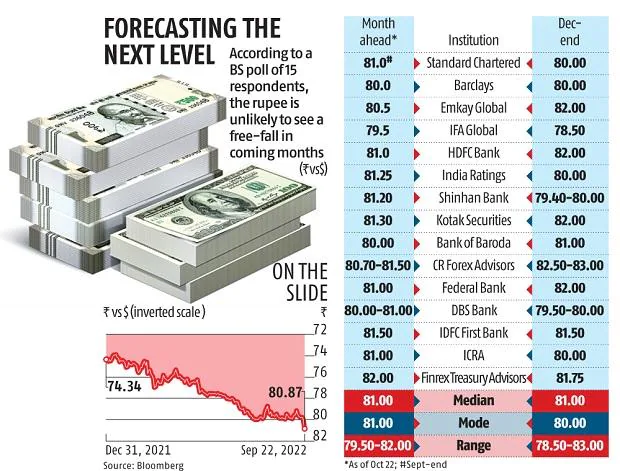Rupee hits new low vs USD on hawkish Fed; poll shows currency at 81 by Dec
The rupee on Thursday hurtled to a new low against the dollar, weakening 1.1 per cent, as the Federal Reserve (Fed) on Wednesday not only raised interest rates but signalled a longer monetary tightening cycle than was expected earlier.
After suffering its steepest single-day fall since the Ukraine war broke out, the rupee settled at 80.87 as against 79.98 at the previous close. The domestic currency has depreciated 8 per cent so far in 2022.
The dollar index, which rose to fresh 20-year highs on Thursday, has gained 16 per cent so far in the calendar year.
Thursday is the first time that the rupee has ended lower than 80. While the local currency had breached that level on three occasions in the past — with the previous intraday low at 80.13 — it recovered to close stronger.
Government bonds too weakened sharply on Thursday, with the yield on the 10-year bond settling 8 basis points higher at 7.31 per cent. Bond prices and yields move inversely. The carnage in the domestic currency market was exacerbated by a rush to square off positions taken against the dollar ahead of the Fed’s policy statement.
The rupee ranked among the worst performers amid emerging market currencies on Thursday, faring worse than 14 others. Only the South Korean won took a greater beating, losing 1.2 per cent against the dollar.
“The move (on Thursday) was a catch-up. The market went too short on the dollar; there was a view that possibly the dollar index has topped because the Fed might suddenly sound quite dovish. But they were caught on the wrong foot,” said Anindya Banerjee, vice-president (currency derivatives and interest rate derivatives), Kotak Securities.
According to a Business Standard poll of 15 respondents, the rupee is not seen suffering a free fall.
For the month ahead, it is seen in the band 79.50-82.00, with the median of expectations at 81. Till the end of December, the poll showed a range of 78.50-83.00 with the median again at 81. The mode of the poll pegged the rupee at 81 one month from now and at 80 at the end of December.
With the Federal Reserve’s latest estimates indicating rate hikes of at least 100 basis points more in 2022, strength in the dollar is a given. What will determine the extent of the rupee’s depreciation is the Reserve Bank of India’s (RBI’s) approach to interventions in the currency market.

The central bank here is expected to sell dollars, but analysts are divided as to the extent.
The RBI has left no stone unturned to shield the rupee in 2022. Consequently, its foreign exchange reserves have fallen to a two-year low of $550.87 billion versus $631.53 billion before the Ukraine war broke out.
While the RBI has made clear its commitment to curtail excessive volatility in the rupee, analysts doubt how far it can stay the course. The reserves in early September accounted for 9 months’ imports projected for this fiscal year. A year ago, the reserves accounted for close to 15 months’ imports.
“If you look at today’s rupee move it explains that dollar selling by locals has reduced and this is a signal that they’re (the RBI) more tolerant of a weaker rupee and would allow it to trade in line with the fundamentals and at the same time manage their forex reserves more prudently, especially after a hawkish Fed,” said Anubhuti Sahay, head of economic research (South Asia), Standard Chartered Bank.
The RBI’s aggressive dollar sales — $22 billion together in the spot market in June and July — have contributed to the rupee outperforming other emerging market currencies over the past one month, during which it has weakened 1.2 per cent, faring better than nine others.
“The dollar index will top out soon. As we move close to December, expectations on terminal rates will be more accurate. The euro and pound are all at historical lows. I don’t feel that the market will stay at these levels. At the same time, the RBI is not comfortable above 80,” IFA Global Chief Economic Officer Abhishek Goenka said.
IDFC First Bank Economist Gaura Sen Gupta said: “Our expectations of rupee depreciation are led by narrowing interest rate differentials because the RBI will not be as hawkish as the Fed.”
 Loan, Personal Loan, Home Loan, Business Loan,Loans in India Loan in India, Personal Loan, Home Loan, Business Loan, Loans in India,Loan Finance,Loan in India, Get Instant Personal Loan,Home Loan, Business Loans in India
Loan, Personal Loan, Home Loan, Business Loan,Loans in India Loan in India, Personal Loan, Home Loan, Business Loan, Loans in India,Loan Finance,Loan in India, Get Instant Personal Loan,Home Loan, Business Loans in India